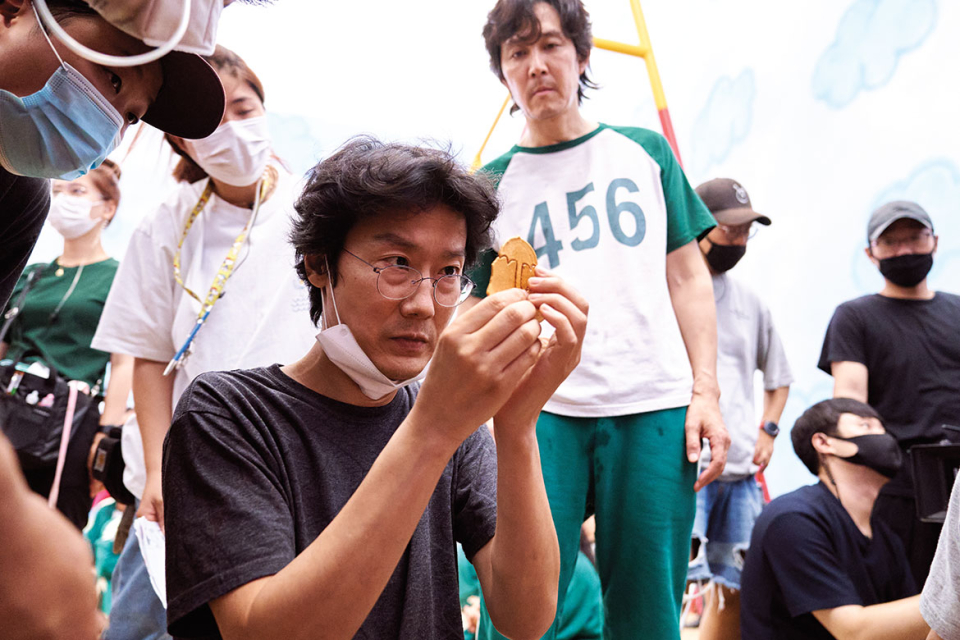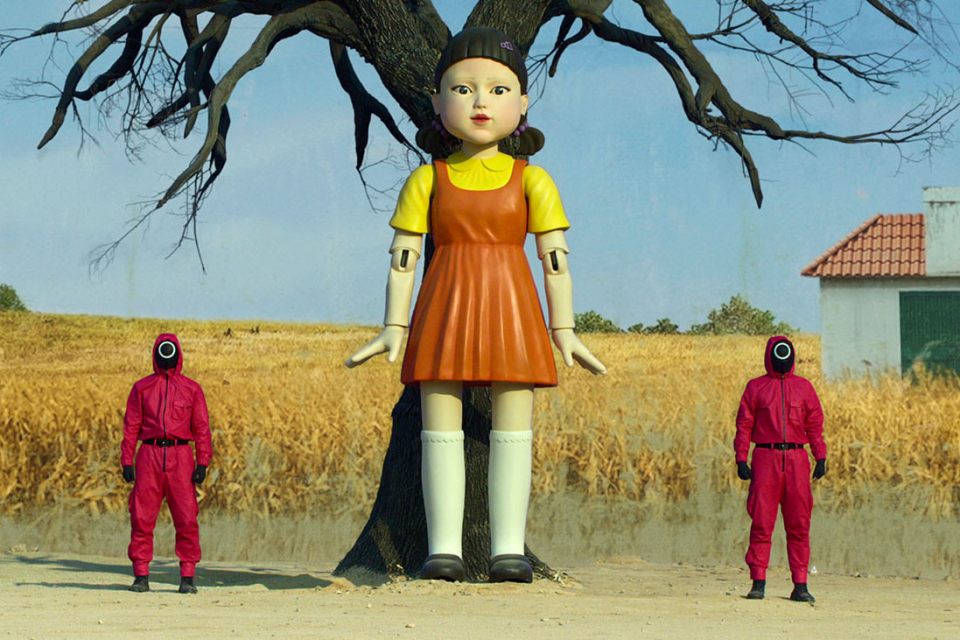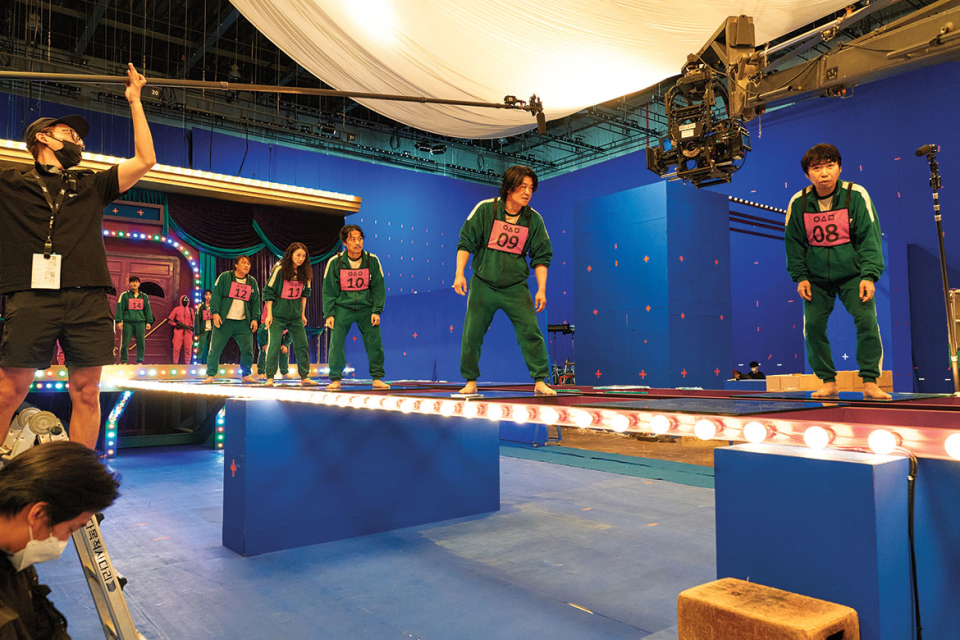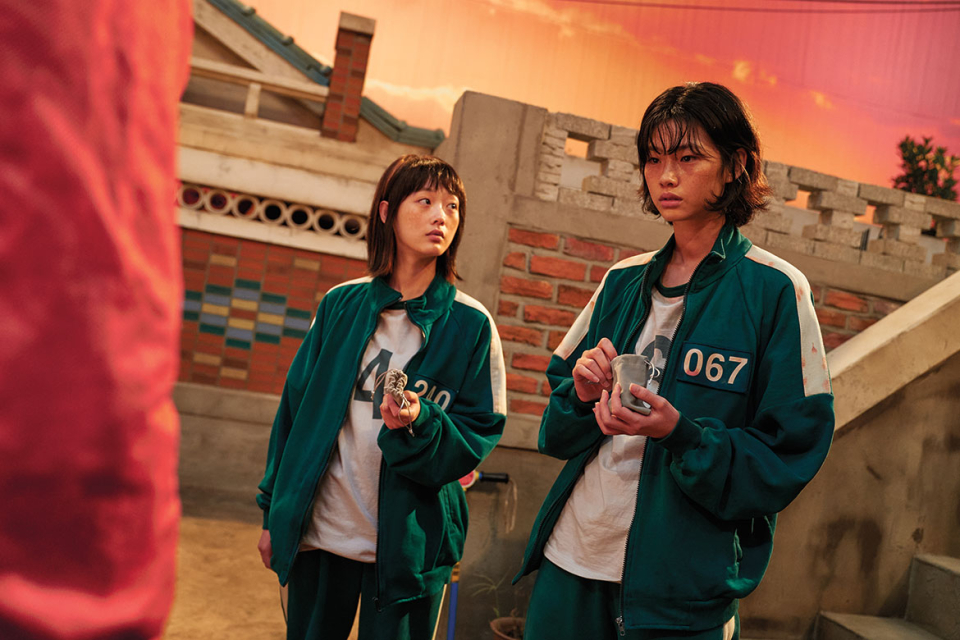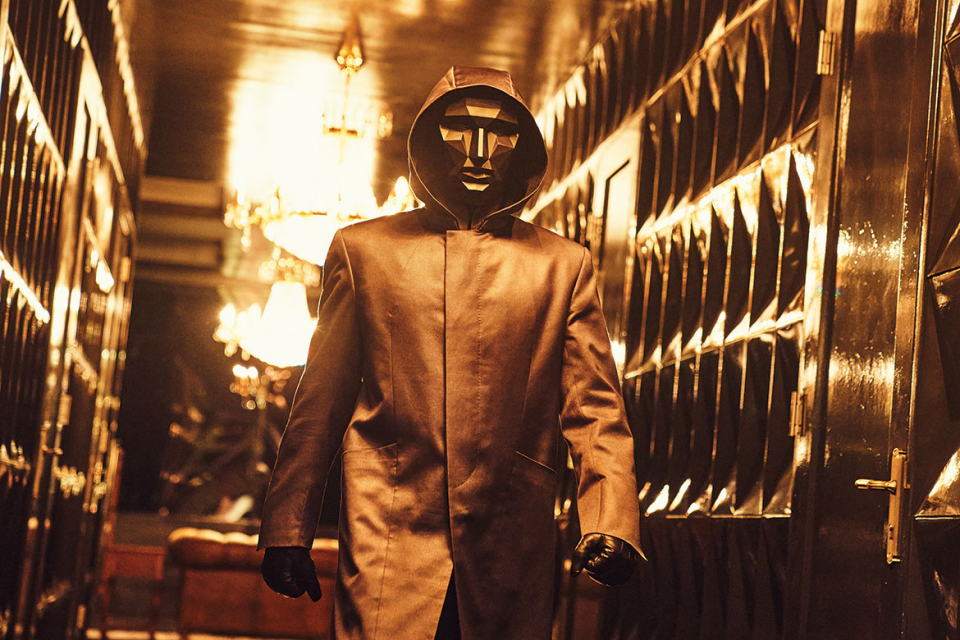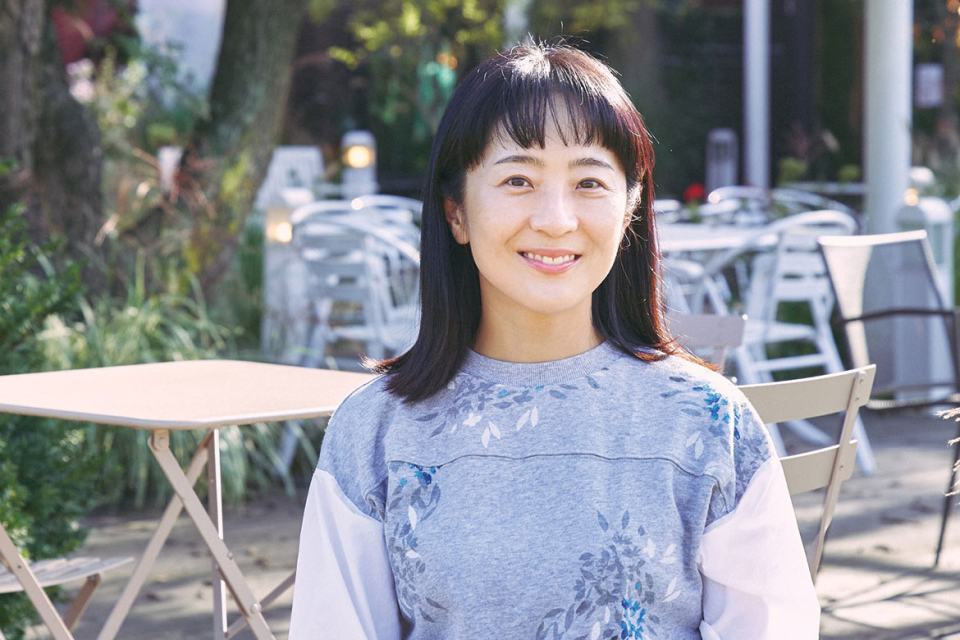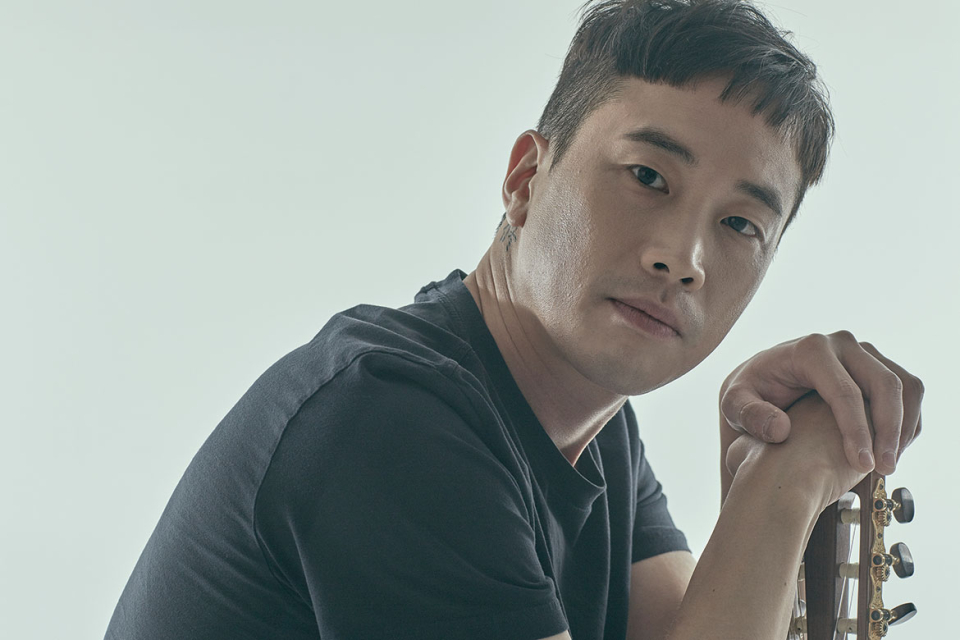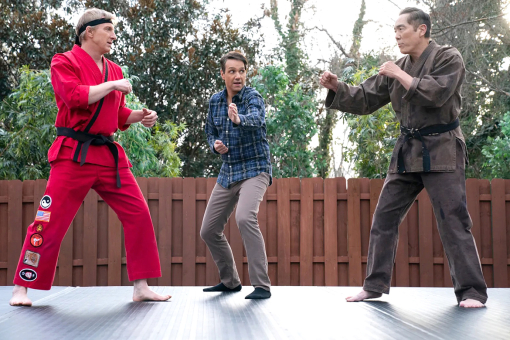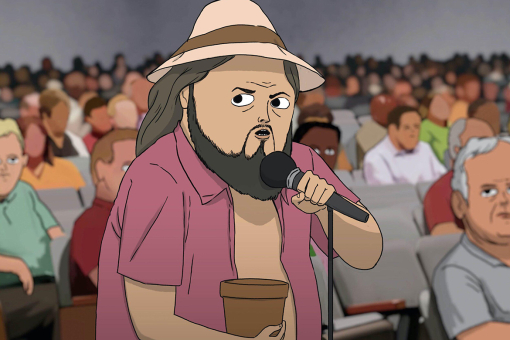There's no painless way to say this, so here goes: when writer and director Hwang Dong-Hyuk gets stressed, his teeth start to dislodge from his gums and wiggle around.
The situation became so troublesome during the production of Squid Game that as soon he wrapped the final episode in June, he booked it to his dentist for help. "He looked inside and said that he had to pull out six teeth because they had all gone bad," Dong-Hyuk explains via an interpreter on Zoom. He received three implants on the bottom and, as of October, still had three more to go. He opens his mouth and proudly points to an open space near his front incisor.
"Look," he says in English. "You can see one right here!"
Of course, Dong-Hyuk has a big reason to smile and show off those new pearly whites these days. He scripted and directed all nine episodes of Squid Game, which is not just a hit — it's a groundbreaking global phenomenon.
Since premiering on Netflix on September 17, the Korean dramatic thriller — about 456 desperate adults fighting to the death in a series of children's games in a bid to win $38 million — has shot to number one in ninety-four countries and counting (including the U.S. and the U.K.). Squid Game–related videos have been viewed more than 65 billion times on TikTok. Saturday Night Live parodied the series in a musical digital short.
And on October 13, just a few weeks after Netflix co-chief executive officer and chief content officer Ted Sarandos predicted in an interview that there's "a very good chance it's going to be our biggest show ever," the streaming behemoth made it official: more than 111 million households had queued up Squid Game in its first seventeen days, shattering the previous record (82 million) set by Bridgerton.
This is a highly unlikely success story, and not just because of the pitch-black subject matter and an abundance of gruesome death scenes. (We'll skip the what-does-this-say-about-our-society commentary for now.) Consider that Squid Game, like the 2020 Best Picture Oscar winner Parasite, was filmed almost entirely in Korean and requires reading subtitles to get the full experience.
"I know for English speakers it's not easy," Dong-Hyuk says. "And I'm very honored that my show proved that they can enjoy shows that are not in English." And while Lee Jung-jae (Seong Gi-hun, player 456) and Jung Hoyeon (Kang Sae-byeok, player 67) are A-listers in their home country, they're new to American viewers.
Perhaps most surprising of all, this international smash is the work of a South Korea–raised, USC grad school alum who was once so cash-strapped that he had to sell his own laptop. "I never could have dreamed of success this big," he says. "My dream was maybe topping the U.S. chart. For everyone to watch it and to see all these memes and parodies, I never could have expected it. I'm very pleasantly surprised and feel like I'm on an emotional rollercoaster."
It's only a small stretch to say that Squid Game is based on Dong-Hyuk's own story. The roots are evident. In 2008, he was "economically struggling" with too much time on his hands. While hanging out at Korean comic-book cafes, he'd leaf through Japanese Manga series like Battle Royale and Liar Game. "I thought, 'I would participate for a money prize,'" he recalls. The clichéd lightbulb went off. He quickly tapped out a movie screenplay, setting the action on an island compound in South Korea.
The project was shopped and passed over for a full decade until, to paraphrase one of the games, Netflix executives changed the status from red light to green light. And though Dong-Hyuk — who made films such as 2011's Silenced and 2017's The Fortress in the interim — says he was initially "really excited" about the developments, that feeling was fleeting.
"As time went on, I was scared and nervous and overwhelmed," he admits. "I had concerns that maybe there was a reason why I couldn't get an investment for ten years. I mean, the world had changed during this time. Maybe people would think the story was too bizarre and wouldn't be able to relate to it. I was worried that if I do something a little bit wrong, then people could really hate it."
He called in reinforcements. He had worked with art director Chae Kyoung-sun on several films in the past and asked if she would help create the candy-colored dystopian world he envisioned. "He said he wanted it to be like a Korean fantasy that was kind of a cruel fairy tale," she explains via an interpreter. "I knew this was going to be really fun. Director Hwang always lets me unleash my full potential as an art director."
For inspiration, she and her team looked through coloring books and her young daughter's illustrated books. Her focus was on contrasting the bright colors with the contestants trying, vying and lying for the money.
"All these participants have their own history," she say. "I tried to understand their feelings and conveyed the images that came to my mind when I thought of their troubles in life. It's like they were left behind on the side of the highway." To wit, while some of the game spaces resemble deceptively safe children's playgrounds, the players' dormitory is drenched in bland, steely grays.
For the musical component, composer Jung Jae-il (Parasite) says his director gave him very little, well, direction. "All he told me was that he didn't want anything in a 'Hollywood style,'" he says through an interpreter. A fan of David Lynch and his longtime maestro Angelo Badalamenti, Jung and two musicians — one who goes by the name 23 and another named Park Min-ju — opted for a devilish and eerie vibe using percussion, fuzzy guitar and Hammond organs, among other instruments. The series also relies on familiar pieces of classical music.
Reading the scripts in advance, "the biggest theme I thought of was that these people were on the verge of the end of their lives, almost like they're on a cliff," Jae-il says. "But they still couldn't let go of that last piece of humanity inside them. That's what I concentrated on the most."
"Here, let me show you," Dong-Hyuk says, before heading to the back of his room. He grabs a circular piece of cardboard and places it in one hand. Facing the camera, he instructs, "Now you have to bet if the paper is in my left hand or right hand."
This game was featured in his original Squid Game movie script. But when he started to break up his narrative and crafted the "Gganbu" episode — in which two players must compete head-to-head — he determined they should instead win by nabbing all ten of each other's marbles. "The marbles game was more intuitive, and the rules weren't as hard," he says.
Other obstacles during the nine-month production in South Korea proved more challenging — yet yielded equally remarkable results. "From an abstract point of view, the hardest part was striking a balance between the surrealness of the concept and the realness of the people and their stories," he says. "I wanted the viewers to feel excited but also make them realize that we shouldn't have to live in this capitalist, competitive society."
To achieve this, the games themselves had to look authentic. Kyoung-sun decided to minimize computer graphics and instead create materials from scratch. "The 456 participants needed to feel like they were really in the game," she explains. Three of the biggest studios in South Korea were rented out for nearly eight months, and the team spent thirty to forty-five days constructing each game.
Nothing was child's play. That giant robot girl that dictates the Red Light, Green Light game? A special props-making team from Utica, New York– based Geppetto Studios helped create a miniature doll first, then scaled it up to the full-sized prop. (FYI, it's now wrapped up and sitting at a studio in Korea, ready for the next game.) For the Tug of War, actors worked on a set four feet high while stuntpeople did wire work on a second set almost twenty feet in the air. The dangerously high glass bridge in episode seven was also built to scale just four feet in the air; Kyoung-sun says they used "a little bit" of computer graphics for safety's sake each time a piece of glass shattered.
The simplest game required the most labor and creativity. In the "Gganbu" marbles episode, Kyoung-sun aimed to make the set resemble a Korean neighborhood and its alleys circa the 1970s and '80s. "I wanted to make sure it raised a kind of nostalgia in the participants and the audience," she says. She visited factories to obtain glass materials for the house windows and even crafted small details like bags of delivered milk hanging on the doorknobs, and wooden name pads on the doors. "These props aren't for sale anymore, so I did it all myself," she says.
Meanwhile, Jae-il composed from his home in suburban Seoul over a six-month period, mostly using musical recorders and castanets — i.e., the instruments that Korean kids use in elementary school. "I wanted to make music that represents fights and conflicts using these childish instruments from music class," he says. He and 23 recorded the full score in a studio using a piano and orchestra.
The time crunch — by comparison, the two-hour feature Parasite also took six months — caused him much anxiety. "I was pulling all-nighters and burning the midnight oil," he says. Plus, his director would often make house calls to check up on him: "If he was happy, I was happy. If he's not, then misery!" (The scene he was most nervous about: the very first piece of music in episode one.)
But for Dong-Hyuk, all the hand wringing was worth it once the production took shape. "When I was on the set and saw all my visions become realized, it was so exhilarating," he says. "Everything was exactly the way I wanted it."
Now he and his team are, well, enjoying their winnings. Despite initial mixed reviews in Korea, Dong-Hyuk sensed he may have created something special when an old American friend from school came out of the woodwork both to congratulate him and to share a fun fact.
"He told me that he went out in his neighborhood and saw that all the houses were watching Squid Game," he says. "That was the first time I realized that this was a really big hit." (And yes, he does keep tabs on fan theories on social media.) Kyoung-sun's voicemail was also stuffed with laudatory messages: "My parents were happy, and my daughter's really proud of me. I'm proud of myself."
As for season two? In the initial flush of breakout buzz, the auteur said he didn't have the emotional energy to continue with the series. But now he says he's "thinking about it." He has ideas — such as fleshing out the relationship between the mysterious front man and his police-officer brother, and delving into the backstory of the slap-happy contestant recruiter. (It would also be nice to know what happens after Seong Gi-hun refuses to board a flight to Los Angeles and instead walks out of the jetway, apparently determined to settle a score.)
Not surprisingly, Dong-Hyuk is consumed with the kind of anxiety that a dentist could appreciate. "I'm concerned because season one is such a big hit, I have to really live up to expectations. I'm worried about that," he says. On the bright side, he notes, "I feel like if I don't make a season two, then people will hate me." Soooo... green light?
More articles celebrating Asian American & Pacific Islander Heritage Month.

